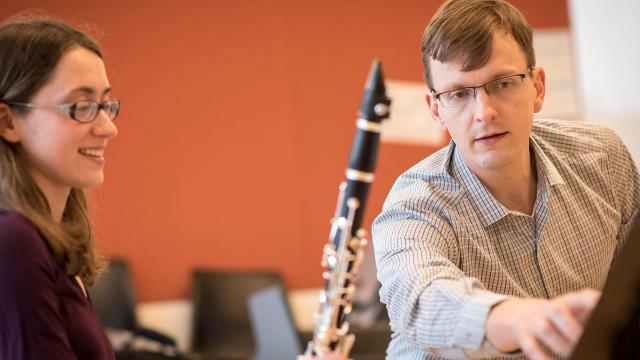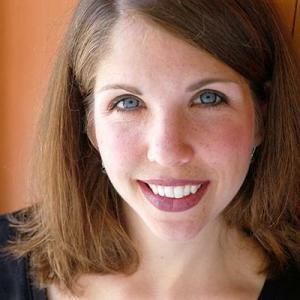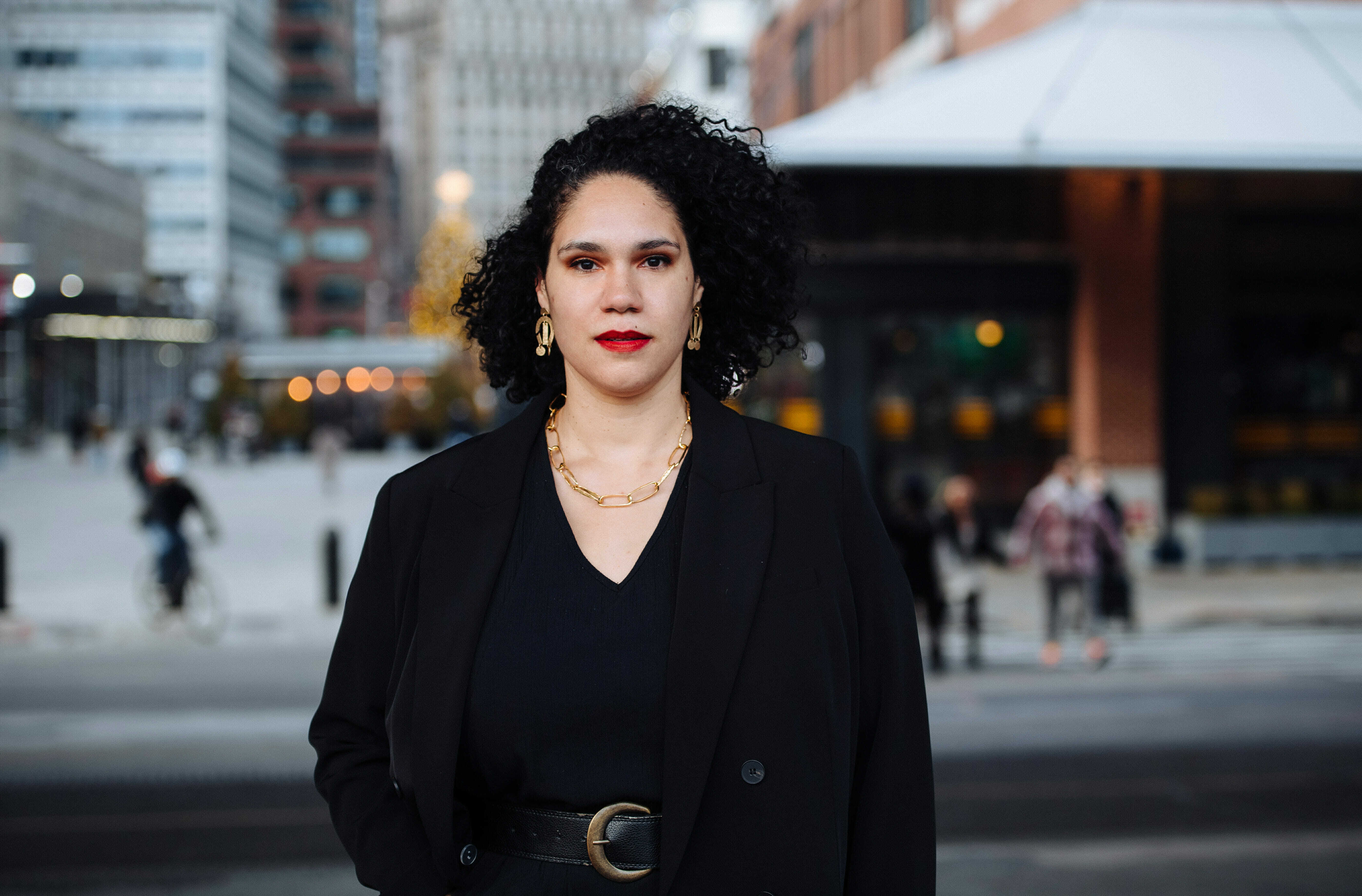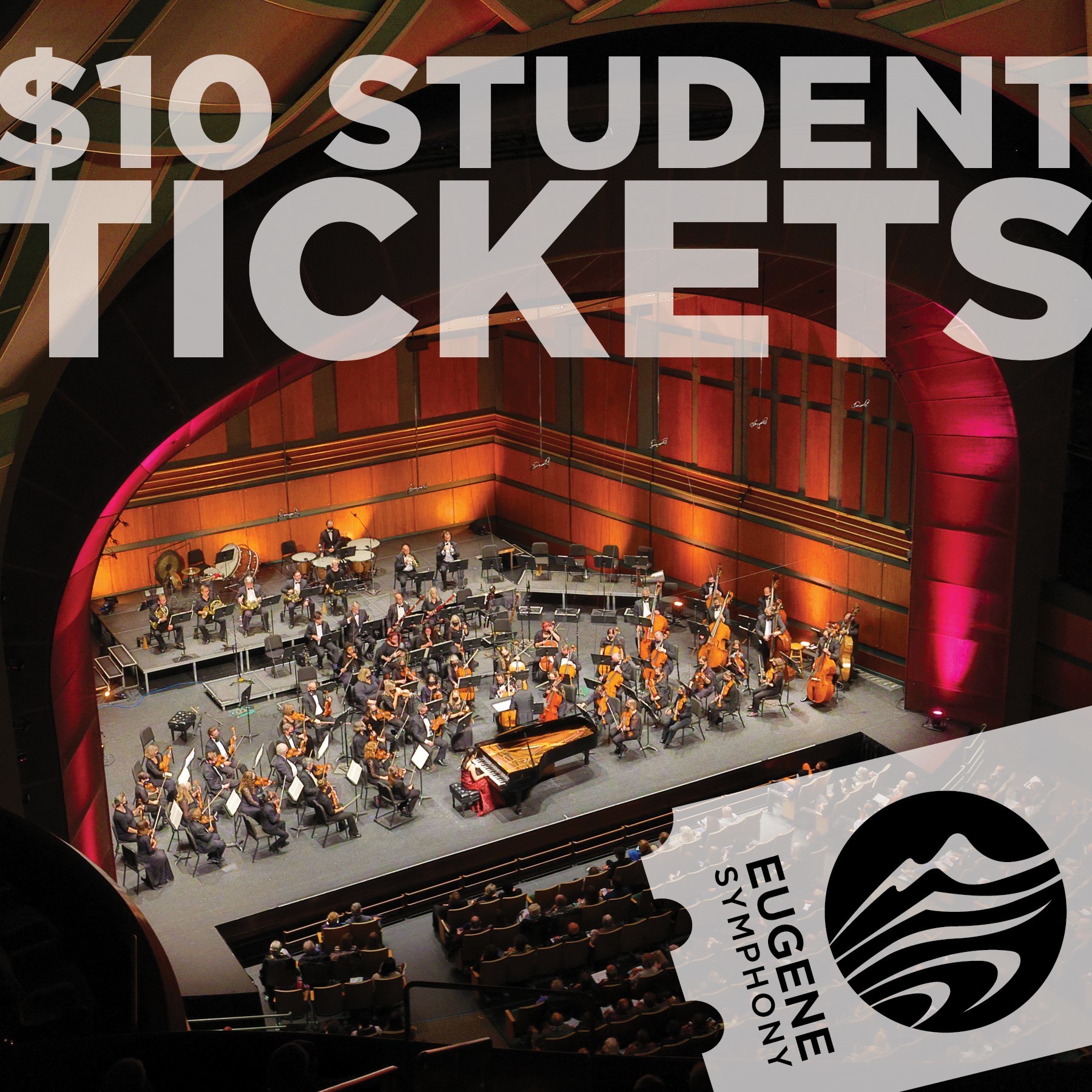Thu May 25 | 7:30 PM
Ravel’s
Daphnis et Chloé
Eugene native Carey Bell joins the orchestra for Copland's Clarinet Concerto alongside Jessie Montgomery's Soul Force and Ravel's romantic Daphnis et Chloé.
TICKETSMay 25, 2023 7:30 PM
Ravel’s
Daphnis et Chloé
Carey Bell, clarinet
Eugene Symphony Chorus, Dr. Melissa Brunkan, acting chorus director
Our season of storytelling comes to a close with Maurice Ravel’s balletic masterpiece Daphnis et Chloe. It combines a dramatic narrative sweep with jaw-dropping Impressionist details, and will bring you to the edge of your Silva Concert Hall seat. Eugene native Carey Bell, now Principal Clarinet of the famed San Francisco Symphony, returns home to play Aaron Copland’s lyrical and lively Concerto, originally written for jazz legend Benny Goodman. American powerhouse Jessie Montgomery’s opening work draws on big-band jazz, R&B, and funk to weave a sonic tapestry. Your spirit will soar!
LEARN MORE
- Listen to the below Spotify playlist, curated by Music Director & Conductor Francesco Lecce-Chong, for inspiration and insight into the exciting final concert of our 2022/23 Season.
- Watch the below video of Music Director & Conductor Francesco Lecce-Chong introducing the exciting offerings of Ravel's Daphnis et Chloé.
- Read our First-Timers Guide to brush up on orchestra vocabulary and find out what to expect from a concert at the Hult Center
- Join us Thursday, May 25 at 6:30 pm for the Guild Pre-Concert Talk in the Studio at the Hult Center with Music Director & Conductor Francesco Lecce-Chong and guest clarinetist Carey Bell. This is the perfect opportunity to get historical background and context for the pieces in this concert. Please sit in your ticketed seat.
- Download our Digital Program Book to learn more about each of the pieces before the concert.
Check out these free events to enhance your concert-going experience:
- Monday, May 22, 5 pm: Symphony Happy Hour at the First National Taphouse, hosted by Music Director & Conductor Francesco Lecce-Chong
- Tuesday, May 23, 4 pm: Clarinet Master Class with guest clarinetist Carey Bell
- Thursday, May 25, 6:30 pm: Guild Pre-Concert Talk in the Silva at the Hult Center, hosted by Francesco Lecce-Chong with guest clarinetist Carey Bell
About Carey Bell

Carey Bell has been the San Francisco Symphony's Principal Clarinet and occupant of the William R. and Gretchen B. Kimball Chair since 2007. He has held principal positions with the San Francisco Opera Orchestra and Syracuse Symphony, and he has served as acting principal clarinet of the San Francisco Ballet Orchestra and guest principal clarinet with The Philadelphia Orchestra.
As a soloist with SFS, Mr. Bell has performed the clarinet concertos of Mozart and Nielsen as well as Bernstein's "Prelude, Fugue and Riffs" and Debussy's "Première Rhapsodie." His summer engagements include the Marlboro Music Festival, Music@Menlo Chamber Music Festival, Oregon Bach Festival and Telluride Chamber Music Festival. A former member of the San Francisco Contemporary Music Players, Mr. Bell has performed with orchestras and chamber ensembles across the Bay Area and has taught at Stanford University. He joined the faculty of the San Francisco Conservatory of Music in 2016.
Mr. Bell received degrees in performance and composition from the University of Michigan at Ann Arbor, where he studied with clarinetist Fred Ormand and composers William Bolcom, Bright Sheng, Michael Daugherty and Evan Chambers. During his time in Michigan, he participated in summer fellowships at Tanglewood and the Music Academy of the West. After graduating, he continued his clarinet training at DePaul University with Larry Combs and was a member of the Civic Orchestra of Chicago.
About Dr. Melissa Brunkan

Melissa C. Brunkan joined the music education faculty at the University of Oregon in 2017. She holds degrees from the University of Minnesota, Northwestern University, and The University of Kansas and most recently taught at Louisiana State University as assistant professor of vocal music education. Prior to her work at the university level, she taught in public and private schools in the Minneapolis/St, Paul, Milwaukee, and Chicago areas for twelve years, teaching students from pre-K through adult with an emphasis on secondary choral/vocal music. Other experience includes private voice teaching as well as conducting, musical theater directing, post-surgical vocal pedagogy consultation, and workshop facilitation.
Dr. Brunkan has sung and conducted professionally with choirs, opera and theater companies and churches throughout the United States. Vocal performance has taken her to places such as Denver, CO, New York, NY and Chicago, IL. In recent years, she founded a community choir for adults with intellectual disabilities, a community children’s choir for underserved populations, and an online choir for caregivers of children with chronic illness. Her choirs have sung with artists and conductors from places such as China, Venezuela, and Indonesia, performing in various venues from the Minnesota State Capitol to the Kennedy Center.
Her primary research interests include the use of gesture in choral/vocal pedagogy, lifespan voice pedagogy, singers with medical conditions affecting the voice, conductor gesture and behaviors, and the adolescent voice. She has presented research at regional, national, and international venues in such places as Philadelphia, Tucson, Newfoundland, and Greece. Brunkan has published articles in various journals including Journal of Research in Music Education, International Journal of Research in Choral Singing, and The International Journal of Music Education: Research. She has held leadership roles in professional organizations such as the American Choral Directors’ Association, serves on the Board of Directors for the VoiceCare Network, and has served as guest reviewer and editorial assistant for IJME: Research.
About Jessie Montgomery

Jessie Montgomery is an acclaimed composer, violinist, and educator. She is the recipient of the Leonard Bernstein Award from the ASCAP Foundation, the Sphinx Medal of Excellence, and her works are performed frequently around the world by leading musicians and ensembles. Her music interweaves classical music with elements of vernacular music, improvisation, poetry, and social consciousness, making her an acute interpreter of 21st century American sound and experience. Her profoundly felt works have been described as “turbulent, wildly colorful and exploding with life” (The Washington Post).
Her growing body of work includes solo, chamber, vocal, and orchestral works. Some recent highlights include Shift, Change, Turn (2019) commissioned by the Orpheus Chamber Orchestra and the Saint Paul Chamber Orchestra, Coincident Dances (2018) for the Chicago Sinfonietta, and Banner (2014)—written to mark the 200th anniversary of “The Star-Spangled Banner”—for The Sphinx Organization and the Joyce Foundation, which was presented in its UK premiere at the BBC Proms on 7 August 2021.
Summer 2021 brought a varied slate of premiere performances, including Five Freedom Songs, a song cycle conceived with and written for Soprano Julia Bullock, for Sun Valley and Grand Teton Music Festivals, San Francisco and Kansas City Symphonies, Boston and New Haven Symphony Orchestras, and the Virginia Arts Festival (7 August); a site-specific collaboration with Bard SummerScape Festival and Pam Tanowitz Dance, I was waiting for the echo of a better day (8 July); and Passacaglia, a flute quartet for The National Flute Association’s 49th annual convention (13 August).
Since 1999, Jessie has been affiliated with The Sphinx Organization, which supports young African American and Latinx string players and has served as composer-in-residence for the Sphinx Virtuosi, the Organization’s flagship professional touring ensemble.
A founding member of PUBLIQuartet and a former member of the Catalyst Quartet, Jessie holds degrees from the Juilliard School and New York University and is currently a PhD Candidate in Music Composition at Princeton University. She is Professor of violin and composition at The New School. In May 2021, she began her three-year appointment as the Mead Composer-in-Residence with the Chicago Symphony Orchestra.
Program Notes — Ravel's Daphnis et Chloé
The 2022/23 Season concludes with a kaleidoscopic concert that explores the full breadth of sound an orchestra can conjure:
- Jessie Montgomery’s Soul Force, a meditation on Dr. Martin Luther King Jr.’s peaceful activism
- Aaron Copland’s jazz-inspired Clarinet Concerto, featuring Eugene native Carey Bell, who is currently Principal Clarinet of the storied San Francisco Symphony
- Dance with and marvel at Maurice Ravel’s sweeping masterpiece Daphnis et Chloé
Program notes by Daniel Cho, Assistant Conductor
SOUL FORCE
JESSIE MONTGOMERY (B. 1981)
DURATION: Approximately 8 minutes
Program note from the composer:
“Soul Force is a one-movement symphonic work which attempts to portray the notion of a voice that struggles to be heard beyond the shackles of oppression. The music takes on the form of a march which begins with a single voice and gains mass as it rises to a triumphant goal.
Drawing on elements of popular African American musical styles such as big-band jazz, funk, hip-hop and R+B, the piece pays homage to the cultural contributions, the many voices, which have risen against aggressive forces to create an indispensable cultural place.
I have drawn the work’s title from Dr. Martin Luther King’s ‘I Have a Dream’ speech in which he states: ‘We must not allow our creative protest to degenerate into physical violence. Again and again, we must rise to the majestic heights of meeting physical force with soul force.’”
SCORED: For two flutes, two oboes, two clarinets, two bassoons, four horns, three trumpets, three trombones including bass trombone, tuba, timpani, percussion, two harps, and strings.
HISTORY: This is the first Eugene Symphony performance.
CLARINET CONCERTO
AARON COPLAND (1900-1990)
Duration: Approximately 18 minutes
The early to mid-20th-century witnessed the dramatic rise of the United States as both an economic and cultural power on the world stage. Along with this ascension came a desire within the landscape of American classical music to create its own unique style of music, one that could differentiate itself from its European ancestors. Throughout Europe in the 20th-century, classical music as a whole had undergone a shift in values, from a desire to emulate Germanic and Austrian traditions laid by Haydn, Mozart, and Beethoven to a more nationalistic style of composition that drew on folk elements unique to each country’s histories and origins.
The answer came in the form of Aaron Copland. Born in Brooklyn to Jewish immigrants, Copland became one of the most influential composers in Western classical music history, and is today widely considered to be one of America’s greatest composers. His compositional style is defined by galloping rhythmic figures and a musical language based in wide, open intervals between notes, creating a sense of large space within the sound of his music.
The combination of these musical elements evokes a sense of adventure and possibility, tapping into the American image of traveling across vast plains and the idea of searching for opportunity and the pursuit for a better life. Ironically, Copland would also heavily integrate elements of jazz into his works, as well as influences from Latin America, including musical idioms from Cuba and Mexico.
The Clarinet Concerto, composed from 1947 to 1948, was one such work influenced by jazz and came to Copland in the form of a request from renowned jazz clarinetist Benny Goodman, known as “The King of Swing,” who offered the composer the then-substantial sum of $2,000 to compose the work. The compositional process of the work can be tracked through letters Copland wrote to renowned conductor Leonard Bernstein, to whom he wrote upon completion of the work in 1948, “I stayed home a lot and finished my Clarinet Concerto—finally! Tried it over for Benny the other day… seems I wrote the last page too high ‘for all normal purposes.’ So it’ll have to come down a step.” The work was premiered and broadcast by the NBC Symphony in November of 1950.
LISTEN for the jazz influences in this dancing Concerto, commissioned by the “King of Swing,” Benny Goodman.
The work, laid out in two movements, begins with the clarinet playing lyrically and softly over a rhythmic pulse provided by strings and harp. Copland takes full advantage of the clarinet’s sweet timbre, with the opening of this Concerto reminiscent of the opening of his most famous work, the ballet Appalachian Spring. A cadenza section of the work featuring the clarinet alone functions as a transition, with the instrument slowly gaining momentum and speed, transforming the lullaby into a sprightly dance. Light strings and piano provide a bouncing beat as the clarinet impeccably athletically climbs and descends its full range. Soon, the jazz elements bloom fully, with the basses providing a slapping, albeit slower pulse and the clarinet sliding between notes—the music here could be easily heard in a jazz club in New York. The momentum slowly builds again and the work ends in a wild frenzy, with the clarinet wailing at the top of its range.
SCORED: In addition to the solo clarinet, scored for harp, piano, and strings.
HISTORY: First performed in January 1993 under the direction of Marin Alsop and with Sharon Kam as soloist.
DAPHNIS ET CHLOÉ
MAURICE RAVEL (1875-1837)
DURATION: Approximately 42 minutes
When he was approached to write a ballet on the Greek myth of Daphnis and Chloé, French composer Maurice Ravel was ecstatic. The commission had come from Sergei Diaghilev and his Ballets Russes, the world-renowned Russian ballet company that also commissioned and produced some of the greatest works of art in dance and music history, including The Firebird, The Rite of Spring, and Petrushka by Igor Stravinsky, as well as Afternoon of a Faun by Claude Debussy. A commission from Diaghilev and his ballet company was a signal of mastery of one’s craft and an indication of world-class status as an artist and Ravel approached the endeavor with an enthusiasm and vigor appropriate to the opportunity.
Ravel’s sense of excitement and enthusiasm for the project was quickly quelled. The choreographer for the project, Michel Fokine, proved to be difficult to work with, and from the outset had a completely different idea of the ballet than the composer did. Ravel’s vision was one rooted in classicism and nature, evoking images of pristine marble statues and the concepts of democracy and reason that defined the European ideal of Ancient Greece. Fokine, on the other hand, wished to focus more on the erotic and sensual elements of the myth.
Shortly into the collaboration, Ravel wrote to a friend, “I have to tell you that I’ve just had an insane week: preparation of the libretto for a ballet to be performed for the next Russian season, work every night until three in the morning. Things are even more complicated because Fokine doesn’t know a word of French, and all I know of Russian is how to swear in it… you can imagine the atmosphere of these meetings.”
Eventually, Fokine recognized the wisdom in avoiding alienating the creator of the ballet’s music and acquiesced to Ravel’s idea of the work. What resulted was a one-act ballet, comprising three scenes, that Ravel described as “a choreographic symphony in three parts.” The composer’s description of the work is an apt one—the orchestra used for the work is massive and colorful, and includes a choir, and even Ravel feared it was unsuitable for ballet.
The work took 18 months to complete, forcing the ballet company to postpone the premiere of the work by nearly two years and almost cancel the project altogether. Additionally, the highly complicated nature of the music, with its uneven rhythmic language, abrupt changes in tempo, and atmospheric nature made it extremely difficult for dancers of the time to feel comfortable with the choreography. Like many great works of art, however, these elements pushed both musicians and dancers outside their areas of comfort and would go on to become one of the most beloved pieces of music in Western classical music repertoire and inspire countless composers after it.
LISTEN for for how and when Ravel chooses to use certain instruments to create unique soundscapes and colors. Ravel is particularly known for his mastery of orchestration.
The story of Daphnis et Chloé begins with the titular characters in a pastoral, idyllic setting. Shepherds enter, worshiping at the altar of nymphs, while shepherdesses begin to dance seductively around Daphnis. Enraged by this, Chloé retaliates by dancing with a nearby shepherd, Dorcon. Daphnis challenges Dorcon to a dance contest, with the winner being blessed with a kiss from Chloé. Daphnis is triumphant and receives his reward, which is interrupted by an attack by pirates who kidnap Chloé and take her back to their lair. Daphnis and the nymphs pray to the god Pan, asking for his help to save her.
In their cave, the pirates engage in a war dance in a display of their savagery but are interrupted by a group of satyrs and the god Pan, responding to prayers. Daphnis and Chloé joyously reunite as the sun’s rays burst on a hopeful new morning. They are joined by shepherds and nymphs and all join in a wild, passionate dance.
SCORED: For four flutes including alto flute, two piccolos, two oboes, English horn, four clarinets including E-flat and bass clarinets, four bassoons including contrabassoon, four horns, four trumpets, three trombones including bass trombone, tuba, percussion, two harps, celesta, strings, and wordless chorus.
HISTORY: The Suite No. 2 from the ballet was first performed in December 1980 under the direction of Lawrence Maves, and was last performed in October 1996 under the direction of Marin Alsop. The complete ballet was last performed in April 2008 under the direction of Giancarlo Guerrero.
Enter the Eugene Symphony Lottery
Are you feeling lucky? Enter the Eugene Symphony lottery for the chance to win two tickets to an upcoming concert! Fill out this form, including contact information and choose from a variety of our symphonic concerts that you would like to attend. If you are a winner, you will be contacted one week before the concert to collect your winnings.
Health & Safety
The health and safety of Eugene Symphony audience members, musicians, and staff members has been and will always be our top priority. We strongly welcome and encourage patrons who wish to continue wearing masks while attending performances to do so. We want all of our attendees to feel comfortable and accepted in your choice. You take care of you, we'll take care of the music and ensuring that your experience attending a Eugene Symphony concert remains exceptional.
For the most up to date health and safety protocols for our concerts, visit our Eugene Symphony Safety page.
LOCATION: Hult Center for the Performing Arts






